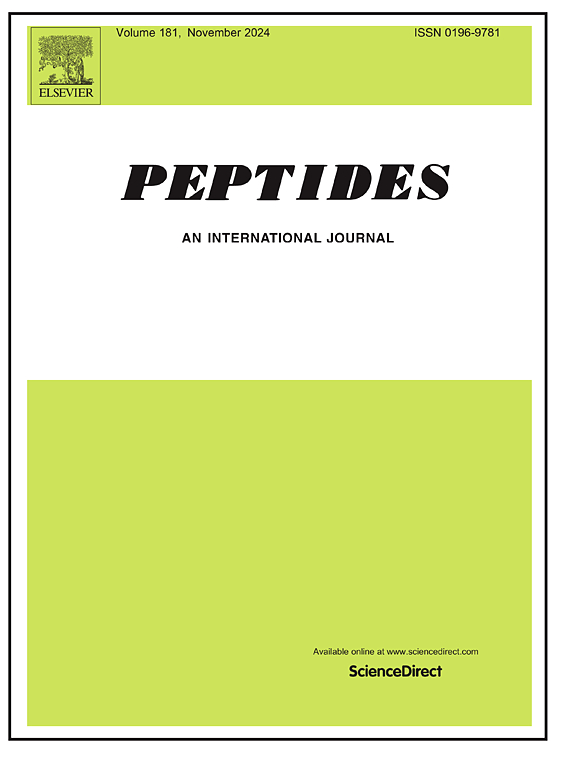Acute effects of peripherally administered nicotine on food intake via the central anorectic peptide nesfatin-1/nucleobindin-2 in adult male rats
IF 2.9
4区 医学
Q3 BIOCHEMISTRY & MOLECULAR BIOLOGY
引用次数: 0
Abstract
Acute/chronic exposure to nicotine modulates feeding behavior in experimental animals and humans. However, how nicotine modulates food intake remains unclear. This study examined the acute effects of the peripheral administration of nicotine on food intake in adult male rats, focusing on the possible involvement of the anorectic peptide nesfatin-1/nucleobindin-2 (NucB2) in the central nervous system (CNS). Initially, cumulative food intake, but not water intake, was significantly decreased 0.5, 1, and 1.5 h after the intraperitoneal administration of nicotine (0.5 mg/kg) in 24h-fasted rats. Subsequently, the double-labeled immunohistochemical study revealed that nesfatin-1/NucB2-immunoreactive (ir) neurons expressed Fos-ir in various nuclei of the hypothalamic and brainstem areas, including the supraoptic nucleus and ventral tegmental areas, 90 min after the intraperitoneal administration of nicotine. Finally, pretreatment with intracerebroventricular administration of antisense RNA against nesfatin-1/NucB2 significantly attenuated the suppression of food intake induced by intraperitoneal nicotine administration. The results indicated that the acute effects of peripherally administered nicotine on the suppression of food intake may be partially involved in nesfatin-1/NucB2-containing neurons in the CNS in male adult rats.
外周给药尼古丁通过中枢厌食肽nesfatin-1/ nucleobinin -2对成年雄性大鼠食物摄入的急性影响
急性/慢性暴露于尼古丁可调节实验动物和人类的摄食行为。然而,尼古丁如何调节食物摄入仍不清楚。本研究研究了尼古丁外周给药对成年雄性大鼠食物摄入的急性影响,重点研究了中枢神经系统(CNS)中厌食肽nesfatin-1/ nucleobinin -2 (NucB2)的可能参与。最初,禁食24小时的大鼠在腹腔注射尼古丁(0.5 mg/kg) 0.5、1和1.5 h后,累积的食物摄取量显著减少,但水的摄取量没有显著减少。随后,双标记免疫组织化学研究发现,在尼古丁腹腔注射90 min后,nesfatin-1/ nucb2免疫反应性(ir)神经元在下丘脑和脑干区域的各个核(包括视上核和腹侧被盖区)表达Fos-ir。最后,脑室内给予针对nesfatin-1/NucB2的反义RNA预处理可显著减弱尼古丁腹腔给药引起的进食抑制。结果提示,外周给药尼古丁对成年雄性大鼠的急性食物摄取量抑制作用可能部分涉及到CNS内含有nesfatin-1/ nucb2的神经元。
本文章由计算机程序翻译,如有差异,请以英文原文为准。
求助全文
约1分钟内获得全文
求助全文
来源期刊

Peptides
医学-生化与分子生物学
CiteScore
6.40
自引率
6.70%
发文量
130
审稿时长
28 days
期刊介绍:
Peptides is an international journal presenting original contributions on the biochemistry, physiology and pharmacology of biological active peptides, as well as their functions that relate to gastroenterology, endocrinology, and behavioral effects.
Peptides emphasizes all aspects of high profile peptide research in mammals and non-mammalian vertebrates. Special consideration can be given to plants and invertebrates. Submission of articles with clinical relevance is particularly encouraged.
 求助内容:
求助内容: 应助结果提醒方式:
应助结果提醒方式:


